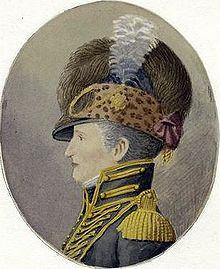Wade Hampton I
Wade Hampton I | |
|---|---|
 | |
| Member of theU.S. House of Representatives fromSouth Carolina's4thdistrict | |
| In office March 4, 1803 – March 3, 1805 | |
| Preceded by | Richard Winn |
| Succeeded by | O'Brien Smith |
| Member of theU.S. House of Representatives fromSouth Carolina's2nddistrict | |
| In office March 4, 1795 – March 3, 1797 | |
| Preceded by | John Hunter |
| Succeeded by | John Rutledge, Jr. |
| Personal details | |
| Born | early 1750s Colony of Virginia,British America |
| Died | February 4, 1835 (aged approximately 82–83) Columbia,South Carolina,U.S. |
| Political party | Democratic-Republican |
| Profession | planter,soldier,politician |
| Military service | |
| Allegiance | |
| Branch/service | |
| Years of service | 1777 - 1781; 1808 - 1814 |
| Rank | Major general |
| Battles/wars | American Revolutionary War 1811 German Coast Uprising War of 1812 |
Wade Hampton(c. 1750– February 4, 1835) was an American military officer, planter and politician. A two-term U.S. congressman, he may have been the wealthiestplanter,and one of the largest slave holders in the United States, at the time of his death.[1][2]
Biography
[edit]Born in the early 1750s, sources vary on Hampton's exact birth year, listing it as 1751,[3]1752,[4]or 1754.[5]He was the scion of the politically importantHampton family,which was influential in South Carolina state politics almost into the 20th century. His second great-grandfather Thomas Hampton (1623–1690) was born in England before moving to the Englishcolony of Virginia.Thomas Hampton's father, William, a wool merchant, sailed from England and appears on the 1618 passenger list of the Bona Novo. The ship was blown off course and arrived in Newfoundland. It would arrive in Jamestown the following year, 1619. He would send for his wife and three children to arrive in Jamestown in 1620.
Military career
[edit]Hampton served in theAmerican Revolutionary Waras a captain in the2nd South Carolina Regiment(1777-1781) and as thelieutenant colonelof a South Carolinavolunteercavalryregiment.He was aDemocratic-Republicanmember of Congressfor South Carolina from 1795 to 1797 and from 1803 to 1805, and apresidential electorin1800.
He was appointed to theU.S. ArmyascolonelofRegiment of Light Dragoonsin October 1808, and was promoted tobrigadier generalin February 1809, appointed as the top military officer in theTerritory of Orleans.[6]
He used the U.S. military presence in New Orleans to suppress the1811 German Coast uprising,aslave rebellionwhich he believed was a Spanish plot. In the same year, he purchasedThe Houmas,asugar plantationinAscension Parish, Louisiana.This may have been a gift for his daughter and son-in-law, as the son-in-law was managing the plantation by 1825.
During theWar of 1812,Hampton commanded American forces in theBattle of the Chateauguayin 1813, leading thousands of U.S. soldiers to defeat at the hands of a little over a thousand Canadianmilitiamenand 180Mohawkwarriors, then getting his army lost in the woods. On April 6, 1814, he resigned hiscommissionand returned to South Carolina.
Later life
[edit]Thereafter, he acquired a large fortune throughlandspeculation.Hampton had amansion,now known as theHampton-Preston House,which is listed on theNational Register of Historic Places,inColumbia, South Carolina.At his death in the 1830s, it was said that he was the wealthiest planter in the U.S. and possessed some 3,000slavesamongst his holdings.[7]In hisanti-slaverycompendiumAmerican Slavery As It Is,Theodore Weldcites a witness who heard him boasting that he killed some of his slaves for a nutritional experiment. The witness represents Hampton's words as: "[T]hey died like rotten sheep!!"[8]
Wade Hampton I is interred in the churchyard atTrinity Episcopal Churchin Columbia, South Carolina'scapital city.
His sonWade Hampton IIand grandsonWade Hampton IIIalso became prominent in South Carolina social and political circles.
Legacy
[edit]Fort Hampton,a fort in Alabama, was named for General Hampton.[9]
See also
[edit]Notes
[edit]- ^Bridwell, Ronald E. (2016). "Hampton, Wade I".South Carolina Encyclopedia.University of South Carolina.
- ^Weil, Julie Zauzmer (January 10, 2022)."More than 1,800 congressmen once enslaved Black people. This is who they were, and how they shaped the nation".Washington Post.RetrievedMay 5,2024.Database at"Congress slaveowners",The Washington Post,January 13, 2022,retrievedApril 29,2024
- ^Wade Hampton III Biography, Robert K. Ackerman
- ^Wade Hampton I Congressional Biography
- ^Adams, Henry(1986).History of the United States during the Administrations of James Madison.Library of America. p. 493.
- ^Heitman p. 78
- ^http://www.rootsweb.ancestry.com/~msissaq2/hampton.htmlThe Wade Hampton Family, The Issaquena Genealogy and History Project, Rootsweb, retrieved May 7, 2017
- ^American Slavery as It Is: Testimony of a Thousand Witnesses,p. 29,retrievedMay 27,2020
- ^Harris, W. Stuart (1977).Dead Towns of Alabama.Tuscaloosa, Alabama: University of Alabama Press. p. 42.ISBN0-8173-1125-4.
References
[edit]- Heitman, Francis B. (1903)."Historical register and dictionary of the United States Army".War Department.RetrievedOctober 19,2014.
- "HAMPTON, Wade, (1752 - 1835)".Biographical Directory of the United States Congress.RetrievedOctober 20,2014.
External links
[edit]- Wade Hamptonin theLouisiana Historical Association'sDictionary of Louisiana Biography
- Wade Hampton IatFind a Grave
- Wade Hampton LetteratThe Historic New Orleans Collection
- 1750s births
- 1835 deaths
- United States Army generals
- United States Army personnel of the War of 1812
- Battle of the Châteaugay veterans
- 1800 United States presidential electors
- American people of English descent
- Family of Wade Hampton I
- 18th-century American planters
- Democratic-Republican Party members of the United States House of Representatives from South Carolina
- Members of the United States House of Representatives who owned slaves
